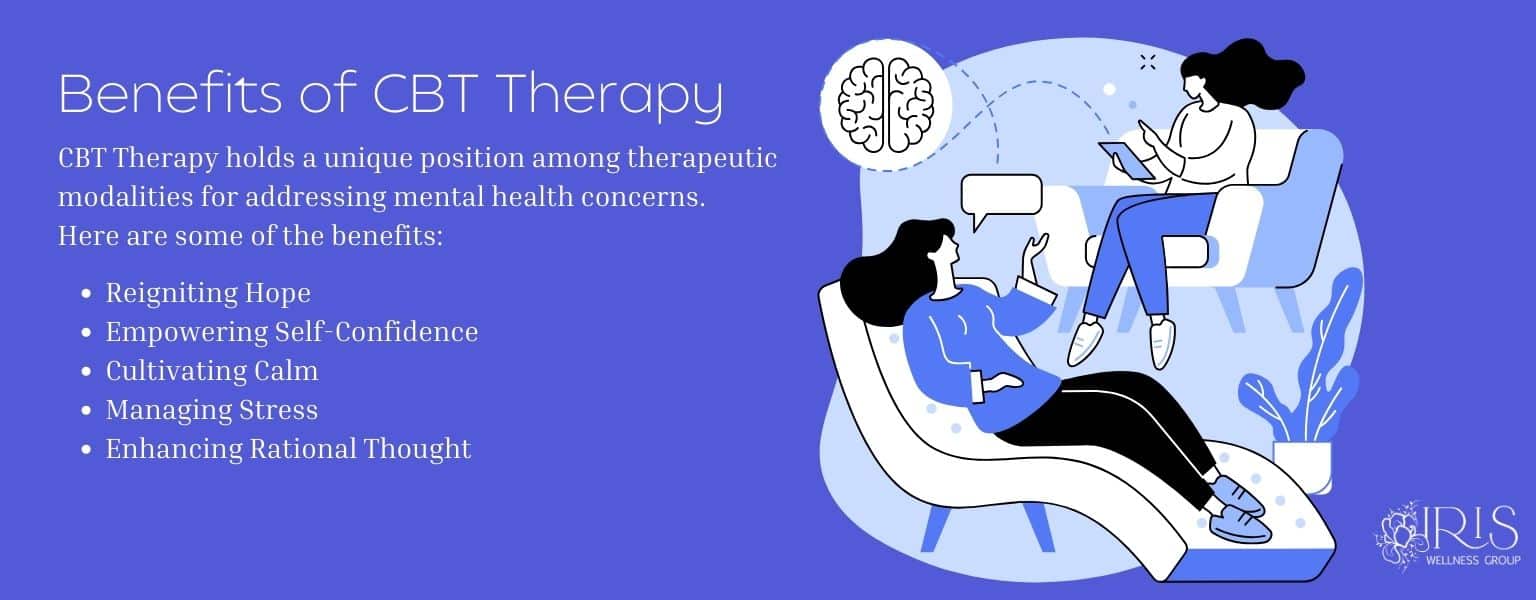Table of Contents
At Iris Wellness Group, we offer Cognitive Behavioral Therapy (CBT) in Chattanooga, TN, a therapy method concentrating on the interplay of thoughts, emotions, and actions. Through CBT Therapy in Chattanooga, TN, we guide individuals in recognizing and reshaping adverse thought cycles and behaviors, steering them towards constructive, healthful alternatives.
What is Cognitive Behavioral Therapy?
Cognitive Behavioral Therapy (CBT) is a distinguished psychotherapy technique designed to modify faulty beliefs, enhancing an individual’s ability to handle stress and fortify mental well-being. Esteemed for its methodical and results-oriented approach, CBT is a cornerstone in therapeutic interventions.
Experts like therapists and counselors utilize CBT to manage diverse mental health challenges, rendering it an essential asset in psychological care.
Core principles of CBT include:
- Recognizing that psychological issues often stem from negative or skewed thought cycles.
- Understanding that unproductive behaviors, once learned, can heighten emotional pain.
- Realizing that entrenched misconceptions about oneself and the environment can lead to psychological distress.
- Trusting that individuals can master efficient coping techniques, enhancing their overall emotional state.
What is CBT for Teens?
CBT for Teens is a therapeutic approach that teaches young individuals to identify and alter negative thought patterns and behaviors, enhancing their mental health and overall well-being. This method is rooted in the understanding that thoughts, emotions, and actions are closely linked and that by modifying unhelpful thoughts, one can foster more positive emotions and behaviors.
CBT for teens is tailored to their developmental stage, incorporating age-appropriate strategies and often involving family to support the adolescent’s growth. It focuses on building skills for emotional regulation and coping with challenges, making it effective for treating anxiety, depression, and other issues during adolescence. Through CBT, teenagers gain valuable tools to navigate their complex world, laying the groundwork for a healthier future.
What Conditions Can CBT Therapy Treat?
Cognitive Behavioral Therapy in Chattanooga addresses a plethora of concerns and is frequently the therapy of choice due to its capability to swiftly pinpoint and navigate unique hurdles. Typically requiring fewer sessions, it’s methodical and results-focused.
CBT can assist individuals in:
- Managing mental illness symptoms
- Mitigating the risk of symptom resurgence
- Navigating mental health without sole reliance on medications
- Acquiring skills to manage life’s stressors
- Recognizing and modulating emotions
- Resolving interpersonal disputes and enhancing communication
- Handling grief, loss, or trauma stemming from abuse
- Adjusting to medical conditions
- Controlling persistent physical symptoms
Conditions treated by Cognitive Behavioral Therapy include:
- Depression
- Anxiety and Phobias
- PTSD
- Sleep Disturbances
- Eating Disorders
- OCD
- Substance Abuse
- Bipolar and Thought Disorders
- ADHD
- Borderline Personality Disorder
- Sexual Disorders
- Trauma
- Dual Diagnosis
- Schizophrenia
Sometimes, CBT Therapy yields the best results when merged with other interventions, like medication.
Types of Cognitive Behavioral Therapy
Cognitive Behavioral Therapy is a diverse field, bringing together various techniques and strategies that target our cognition, emotions, and actions. This spectrum ranges from formal psychotherapeutic methods to informal self-guidance mechanisms. The specific therapeutic modalities encompassing CBT Therapy in Chattanooga, TN include:
- Cognitive Therapy: This zeroes in on recognizing and transforming flawed or skewed cognitive patterns, emotional reactions, and behaviors.
- Dialectical Behavior Therapy (DBT): DBT confronts harmful or unsettling cognitions and actions, integrating treatment components like emotional stability and mindfulness.
- Multimodal Therapy: Proposes that to treat psychological challenges effectively, one should address seven intertwined modalities: behavior, emotion, sensation, visualization, cognition, interpersonal dynamics, and pharmaceutical/biological aspects.
- Rational Emotive Behavior Therapy (REBT): Engages in pinpointing unfounded beliefs, actively countering these notions, and evolving to discern and modify these cognitive cycles.
Although each CBT Therapy type adopts its unique stance, they all converge on addressing the foundational cognitive structures leading to emotional and psychological strain.
How Does CBT Therapy Work?
CBT Therapy is a well-researched, structured approach grounded in theoretical principles and practical dialogues. It creates a nurturing space for open discussions with a trained mental health professional, keen on helping individuals tackle their challenges.
Usually, CBT spans a short timeframe, often between five to 20 sessions. Though change doesn’t happen overnight and can sometimes stir deep-seated emotions, having a therapist alongside makes the journey more manageable. Persistence and adherence to set goals gradually usher in noticeable improvements.
A brief overview of the CBT process:
- Defining the Concern: The therapy starts with discussing your challenges, symptoms, and specific worries. Sharing any prior mental health diagnosis sets the stage for targeted goal-setting.
- Engaging in Thoughtful Discussions: Based on your circumstances, your therapist may delve deeper into certain life events, behaviors, or beliefs, aiming to provide clarity on your reactions to challenges.
- Highlighting Negative Patterns: Together, you’ll identify harmful thoughts or behaviors exacerbating your difficulties. Keeping a record of these and your responses can be insightful.
- Developing Coping Mechanisms: In collaboration, you’ll craft tactics to supplant negative patterns with positive ones. By altering your perspective and adopting beneficial practices, you’re better poised to manage life’s adversities.
How Does CBT for Teens Work?
Cognitive Behavioral Therapy (CBT) for teens hinges on the understanding that our thoughts influence our emotions, which in turn shape our actions. The approach seeks to mitigate negative and distorted thought patterns to prevent the onset of harmful emotions and behaviors. Conversely, cultivating a mindset of positive thinking encourages beneficial emotional responses and actions. The essence of CBT for teens is to guide them in altering their thought processes, emotions, and behaviors.
Consider this scenario: A teenager sends a message to a friend and doesn’t receive an immediate reply. Their initial reaction might be to jump to negative conclusions, fearing they have somehow offended their friend, leading to anxiety and thoughts like “Now everyone will dislike me!” CBT equips teens with strategies to pause and assess situations more rationally. Perhaps the friend is simply occupied or hasn’t noticed the message. Even if a misunderstanding has occurred, it’s something that can be resolved. Through continuous application of CBT techniques, teens gradually learn to avoid jumping to negative conclusions, fostering a healthier, more positive outlook on life’s interactions.
How Does CBT Therapy Address Mental Health Disorders?
Many unhealthy or irrational emotions and behaviors stem from past events or traumas that become ingrained in our consciousness. Our compassionate therapists initially focus on helping patients pinpoint their negative “reflexive thoughts.” These reflexive thoughts arise impulsively, often fueled by internalized guilt, self-doubt, or apprehension. Some individuals with mental health challenges or substance use disorders might attempt to numb these distressing feelings by resorting to alcohol or drug misuse. Through CBT Therapy, by re-evaluating and reframing these negative thoughts, patients can alleviate the associated discomfort and develop new, constructive behavioral responses.
What are the Risks of CBT Therapy?
Generally, cognitive behavioral therapy is considered low-risk. However, it may evoke strong emotional responses. Delving into CBT could mean navigating deep-seated emotions and past traumas, leading to moments of sadness, frustration, or anger. Such introspection might leave you feeling emotionally and physically taxed.
Certain CBT Therapy techniques, like exposure therapy, could necessitate facing specific phobias or fears directly, such as confronting the fear of flying by discussing airplanes. This can momentarily heighten stress or anxious feelings.
Nevertheless, partnering with a proficient therapist can mitigate these challenges. The strategies you acquire during therapy will equip you to effectively address and overcome these negative emotions and apprehensions.
Benefits of CBT Therapy in Chattanooga
CBT Therapy holds a unique position among therapeutic modalities for addressing mental health concerns. Here’s why:
- Reigniting Hope: Mental wellness struggles can cast a shadow over one’s outlook. However, CBT shines a light of hope, teaching that our thoughts don’t always align with reality. By interrogating these cognitive patterns, individuals can reshape a brighter, positive path for themselves.
- Empowering Self-Confidence: Many mental health struggles are intertwined with low self-esteem, fueling adverse thinking and actions. CBT disrupts this, nurturing renewed faith in oneself. Understanding that thoughts are alterable can significantly shift one’s self-image.
- Cultivating Calm: On the behavioral front, CBT trains individuals to regulate their responses. Often, this involves mastering relaxation techniques to manage stress, consequently reducing symptoms.
- Enhancing Rational Thought: Fundamentally, CBT teaches individuals to control their cognitive pathways. By spotlighting cognitive biases, which might operate subtly, individuals are trained to interrogate and supplant negative thinking, paving the way for a reasoned approach to life’s hurdles.
CBT Therapy emerges as a potent therapeutic strategy with manifold advantages. It may serve as a primary intervention or work best in tandem with other therapies, making it a versatile choice for many embarking on their healing journey. Contact us today to start your CBT Therapy in Chattanooga, TN.
What Happens During Cognitive Behavioral Therapy Sessions
During sessions, therapists create a safe space for open dialogue about emotions, thoughts, and concerns. If expressing feelings feels challenging, therapists guide the process, ensuring comfort and building confidence.
CBT is typically problem-centric, with a goal-driven methodology. As therapy progresses, therapists might assign “homework”—tasks or readings that reinforce session discussions—motivating real-world application of learned strategies.
The therapy style can be tailored, blending CBT with other techniques, like interpersonal therapy, which zeroes in on interpersonal relationships.
How Long is CBT Therapy?
Cognitive Behavioral Therapy’s design is generally short-term, spanning roughly five to 20 sessions. The number of sessions is determined by several factors, including:
- The nature and severity of the symptoms
- Duration of the prevailing issue
- Rate of progress observed
- Present stress levels
- Support structures, like family or friends
Effectiveness of Cognitive Behavioral Therapy
In the 1960s, psychiatrist Aaron Beck observed that particular thought patterns played a significant role in emotional disturbances. He coined these as “automatic negative thoughts” and pioneered the cognitive therapy method.
While previous behavior therapies primarily centered on using reinforcements and deterrents to alter behavior, the cognitive methodology delved into the influence of thoughts and emotions on behavioral outcomes.
Now, cognitive behavioral therapy stands as one of the most extensively researched therapeutic modalities. It’s recognized for its efficacy in treating an array of psychological conditions, spanning from anxiety, depression, and insomnia to eating disorders, obsessive-compulsive disorder, panic disorder, post-traumatic stress disorder, and substance dependencies.
Key research insights include:
- CBT Therapy is a top-tier, research-backed method for addressing eating disorders.
- It’s beneficial for individuals with sleep disturbances, including those grappling with physical pain or mood disorders like depression.
- The therapy has shown positive outcomes in alleviating depression and anxiety symptoms in young individuals.
- A comprehensive review in 2018, examining 41 studies, highlighted CBT’s effectiveness in alleviating symptoms for those with anxiety and related disorders.
- Cognitive Behavioral Therapy provides robust evidence-based support for treating substance use issues, aiding individuals in enhancing self-discipline, sidestepping triggers, and crafting coping strategies.
Given its goal-centric approach and the ease with which outcomes can be gauged, CBT Therapy in Chattanooga, TN remains a focal point of therapeutic research and application.
Cognitive Behavioral Therapy (CBT) for Adolescents in Chattanooga, TN
CBT Therapy for adolescents in Chattanooga, TN, has been instrumental in providing a structured pathway to navigate the complexities of their teenage years. The unique challenges adolescents face, from peer pressures to academic demands and evolving self-identity, often require specialized therapeutic approaches.
Iris Wellness Group’s Adolescent Intensive Outpatient Program (IOP) in Chattanooga, TN integrates CBT Therapy principles tailored for this age group, offering them techniques to identify and rectify negative thought patterns. This program empowers teens to develop resilience, better understand their emotions, and build strategies for healthier interactions.
Through our teen IOP in Chattanooga, TN, adolescents and teens receive not only therapy but also an engaging environment where they actively participate in crafting their road to mental well-being.
Cognitive Behavioral Therapy (CBT) in Chattanooga, TN
CBT therapy in Chattanooga, TN aids clients in discerning and remodeling harmful cognitive and behavioral patterns, promoting holistic well-being. Instead of merely analyzing past traumas, CBT is solution-centric, empowering clients to challenge and modify misaligned beliefs leading to unfavorable behaviors.
In essence, CBT offers a structured pathway to address mental health dilemmas. At Iris Wellness Group, our therapeutic approach seamlessly integrates evidence-based techniques across IOP (Intensive Outpatient Program), standard outpatient program, and PHP (Partial Hospitalization Program). We firmly believe that every individual deserves a life filled with wellness and balance. Through CBT Therapy, and our varied care levels, we provide tailored guidance for our clients as they embark on transformative paths to better mental health.
To delve deeper into Cognitive Behavioral Therapy in Chattanooga or to explore other therapeutic offerings, reach out to us. Let us guide you or your loved ones towards a fulfilling, balanced life.
Cognitive Behavioral Therapy (CBT) Frequently Asked Questions
What Is CBT Therapy?
CBT Therapy is a form of psychotherapy that focuses on identifying and changing negative or harmful thought patterns that influence behavior and emotions. It’s a structured, time-limited therapy that aims to solve problems and teach clients skills for modifying dysfunctional thinking and behavior.
What Does Cognitive Behavioral Therapy Do?
CBT helps individuals identify and challenge distorted cognitions and change destructive patterns of behavior. It equips them with strategies to alter negative thinking, improve emotional regulation, and develop personal coping strategies that target solving current problems.
Is CBT Effective For Teenagers?
Yes, research shows that CBT for teens is highly effective in treating mental health disorders such as anxiety, depression, PTSD, and behavioral issues.
Why Is Cognitive Behavioral Therapy Effective?
CBT is effective because it provides practical tools and strategies for managing mental health issues. It’s evidence-based, meaning it has been scientifically tested and shown to be effective in treating a variety of mental health conditions, including depression, anxiety, and PTSD.
How Much Does CBT Therapy Cost?
The cost of CBT therapy varies depending on factors like location, therapist qualifications, and session length. Without insurance, prices can range from $100 to $200 per session. Many insurance plans cover CBT, but it’s important to check coverage details.
What Is the Goal of Cognitive Behavioral Therapy?
The primary goal of Cognitive Behavioral Therapy is to help individuals recognize and change negative thought patterns and behaviors that are causing psychological distress. It aims to teach effective coping strategies for dealing with different life challenges.
What Is Cognitive Behavioral Therapy for Anxiety?
CBT for anxiety involves identifying and challenging irrational fears and beliefs, learning to manage anxiety symptoms, and practicing relaxation techniques. It helps individuals develop healthier ways of thinking that reduce anxiety and improve overall functioning.
What Is Cognitive Behavioral Therapy Used For?
CBT is used for treating a range of mental health conditions, including depression, anxiety disorders, phobias, ADHD, eating disorders, and substance abuse. It’s also effective in managing stress and improving emotional regulation.
Who is Chattanooga Cognitive Behavioral Therapy Designed For?
Chattanooga Cognitive Behavioral Therapy caters to individuals living in Chattanooga, Red Bank, Signal Mountain, Lookout Mountain, Southeastern Tennessee, Northern Georgia, or surrounding areas. These services are ideal for those who do not require medically supervised detoxification, have a stable and supportive home and work environment, and are self-motivated in their journey towards recovery.
Finding Cognitive Behavioral Therapy Near Me
To find “Cognitive Behavioral Therapy near me” or “CBT therapy near you”, search online for licensed therapists who specialize in CBT. You can also ask for referrals from your primary care doctor or check with local mental health clinics. Online therapy platforms are another option for accessing CBT.














